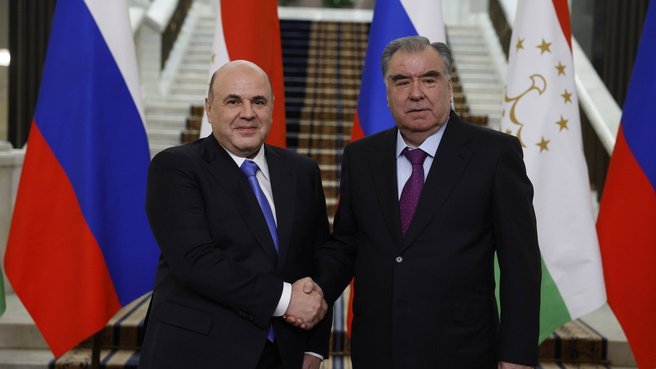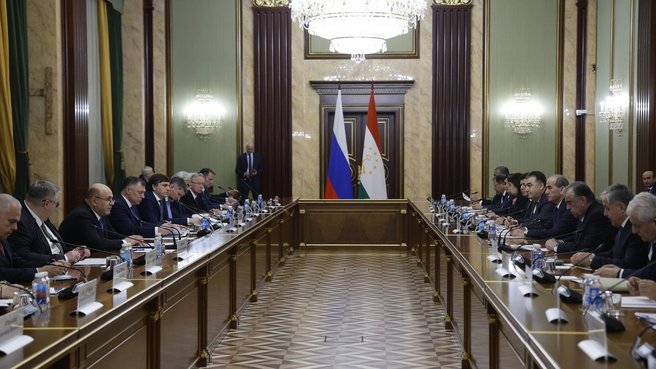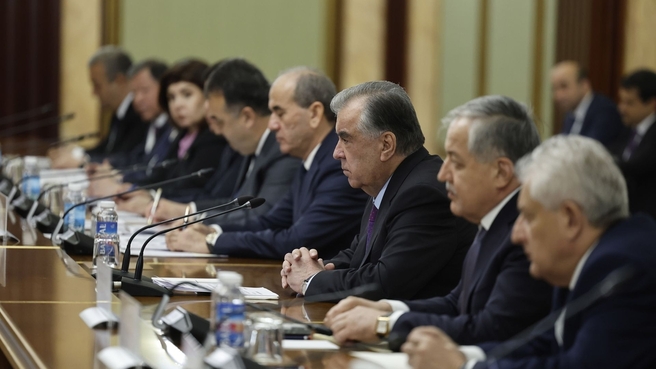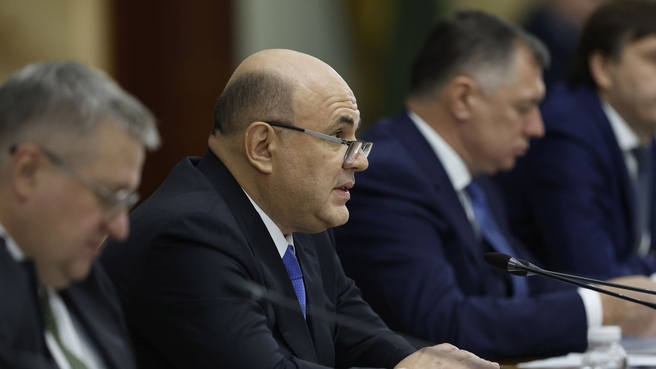The meeting took place as part of the official visit by the President of Republic of Tajikistan Emomali Rahmon to the Russian Federation.
Mikhail Mishustin’s meeting with President of Tajikistan Emomali Rahmon
Excerpts from the transcript:
Mikhail Mishustin: Mr Rahmon, I am sincerely delighted to see you again. Welcome to the Government House of the Russian Federation.
It is with deep warmth that I recollect my conversation with you in March, during my visit to Dushanbe. I would like to use this opportunity to ask you to extend my best wishes to my colleague, the Prime Minister of Tajikistan, Mr Kohir Rasulzoda, and Speaker of the Upper House of Parliament, the Mayor of Dushanbe, Mr Rustam Emomali.
You attended talks with President of Russia Vladimir Putin at the Kremlin earlier today. We at the Government will make every effort to ensure prompt implementation of every agreement reached at the highest level.
We earnestly treasure the friendly partnership and allied relations that bind Russia and Tajikistan, which are underpinned by the principles of friendship, neighbourliness and mutual respect. We attach priority to deepening our practical cooperation. Russia is among Tajikistan’s leading foreign economic partners. In January to September, mutual trade between our countries exceeded 90 billion roubles, or 10 billion Tajik Somoni.
Mutual investment is also on the rise, with Russian capital investment in the economy of Tajikistan already exceeding 148 billion roubles. The business forum held in Dushanbe in March helped spur cooperation.
Russian businesses are interested in promoting new joint projects in energy, industry, tourism, agriculture and other areas. Our intergovernmental commission is addressing intergovernmental issues. The Russian co-chair is Deputy Prime Minister Marat Khusnullin.
We attach great importance to expanding cooperation between our regions. More than 70 Russian regions, but mainly Moscow, St Petersburg, Tatarstan, Bashkortostan, the Altai Territory, as well as the Astrakhan, Nizhny Novgorod, and Novosibirsk, maintain direct business ties with the regions of Tajikistan.
The peoples of our countries are united by cultural and humanitarian ties. In July, Russian Culture Days were held in Tajikistan and in October, Russian Film Days took place there.
We are expanding our interaction in education. Over 35,000 students from Tajikistan are studying in Russia, including around 900 students as part of the Government’s grant quota. Dear Mr Rahmon, we sincerely appreciate your focus on Russian language studies in Tajikistan. Five schools with instruction in Russian have become another symbol of our friendship. In September 2022, President Vladimir Putin and you, dear Mr Rahmon, participated in a ceremony for opening them. In March, I personally visited one of the schools named after Yury Gagarin, and it is simply excellent.
Dear Mr Rahmon, we have an extensive programme.
Please, you have the floor.
Emomali Rahmon: Dear Mr Mishustin,
I am delighted to meet with you this time again. We had a candid dialogue during your visit to Dushanbe.
The Russian Federation is our strategic and reliable partner. Trade is among the important areas of bilateral cooperation. Last year, mutual trade amounted to $1.7 billion, up 24 percent on 2021. In the first nine months of this year, mutual trade exceeded $1.2 billion. Among Tajikistan's overall foreign trade partners, Russia has been first for many years now.
The parties can do much better in investment. We believe that enormous untapped reserves exist in trade and investment. We should take proper measures to use them better.
During our previous meeting in March, you emphasised the importance of resolving the issue of Tajikistan's debt to EXIAR in order to boost Russian investment in our economy. I issued instructions, and this issue was resolved. Thus, the barrier obstructing the path to a significant increase in Russian investment in Tajikistan has been removed.
The Tajik side has submitted over 90 priority investment projects to the Russian side for feasibility studies. We need to join efforts in order to create joint industrial enterprises using existing raw materials, affordable electricity, and skilled labour in Tajikistan. Our countries boast enormous capabilities for implementing joint investment projects in industry. In this regard, please assume personal oversight over the work in this area.
We are interested in implementing joint projects in industries such as mining, metallurgy, defence, oil refining, and the chemical industry. I would like to highlight food processing and light industry, especially textiles, as well as electrical engineering, the pharmaceutical industry, and construction materials manufacturing.
We have sufficient raw material reserves to make it happen. More than 600 large deposits of silver, gold, iron, lead, antimony, coal, food salt, precious stones, and 200 natural resources for aerospace and other strategic industries have been discovered in the region. There is much we can do in this regard. More than 100 deposits are already being developed, and the extraction of about 50 types of mineral resources is underway. The explored subsoil of Tajikistan includes essential mineral resources. We encourage Russian businesses to join efforts in developing them.
It is also important to step up cooperation in creating industrial parks based at former Soviet production facilities. In these matters, we hope to obtain Russia’s technical and financial support.
Many people think that Tajikistan is a backward agrarian republic. However, Tajikistan has invested heavily in uranium production in the past. And we continue to work with Russia in order to bury these storage facilities.
There are many deposits, and the market is very large now, even though it was off-limits before.
The textile and food industries are among the critical areas in our industrial cooperation.
Industrial processing of agricultural products in Tajikistan with subsequent export to Russia is a mutually beneficial venture. There are positive shifts in this area. At present, the BTK Group intends to create a textile cluster in the free economic zone Kulyab.
The energy sector is an important area of interaction between our countries. The construction and operation of the Sangtuda-1 HPP is a vivid example of effective and productive cooperation between our countries.

















